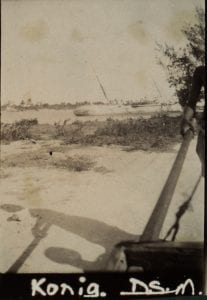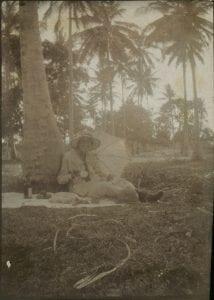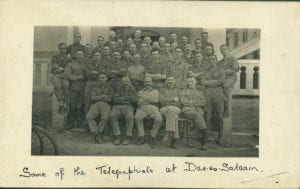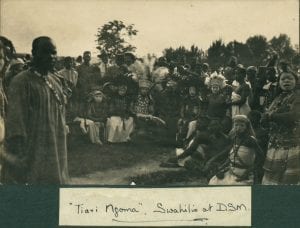Margaret Duncan’s diary: 26-27 March 1918
Posted on by Fay Curtis.
by Nicky Sugar, Archivist at Bristol Archives
In February 1918 Margaret Duncan, a Post Office clerk from Scotland, sailed to East Africa for a new job and new adventures. Her diary and photograph albums are now in the British Empire and Commonwealth Collection at Bristol Archives (ref: 2001/090/2). One hundred years on, we share her story for the first time.
Last month Margaret docked in Dar es Salaam, the captured former capital of German East Africa and still home to many Germans at that point. In this instalment she continues to explore the city, “ever so happy” in the company of Sergeant Jim White…
My diary
Dar es Salaam
Tuesday 26 March 1918
 We still lie in harbour at Dar es Salaam, I don’t mind how long we stay. Sunday morning brought Sergt White aboard again, Sunday afternoon Sparks and Eleanor went to church ashore and “Jim” and I had a Rickshaw ride round and through the prohibited area, along the seashore and close to the wrecked “Konig” which the Germans sank in the Channel with the intention of blocking it. I took a photo of it and Jim took one of me sitting in the Rickshaw, the photos of this tour should prove both interesting and amusing if they turn out. We have a borrowed camera, mine still in the hold.
We still lie in harbour at Dar es Salaam, I don’t mind how long we stay. Sunday morning brought Sergt White aboard again, Sunday afternoon Sparks and Eleanor went to church ashore and “Jim” and I had a Rickshaw ride round and through the prohibited area, along the seashore and close to the wrecked “Konig” which the Germans sank in the Channel with the intention of blocking it. I took a photo of it and Jim took one of me sitting in the Rickshaw, the photos of this tour should prove both interesting and amusing if they turn out. We have a borrowed camera, mine still in the hold.
Yesterday morning I had two visitors, Sapper Harry Potts came aboard first and soon Jim joined us here and we formed a jolly little circle on deck. Potts has been speaking on the Nairobi wire, and they wonder why we are already eight days overdue! Life on a Coasting Steamer is great, half of our time is put off lying in harbour, and trips ashore are absolutely topping.
 We had a delightful little picnic yesterday afternoon, our two selves. Jim had got fruit and cakes and an obliging Greek shopkeeper put Raspberry drink in a bottle for us, so off we set in a Rickshaw to a lovely palm grove on the outskirts of the town. Possibly some day this spot will form part of a delightful public park, there will be a prom and golf course, and this tropical port will become a holiday resort.
We had a delightful little picnic yesterday afternoon, our two selves. Jim had got fruit and cakes and an obliging Greek shopkeeper put Raspberry drink in a bottle for us, so off we set in a Rickshaw to a lovely palm grove on the outskirts of the town. Possibly some day this spot will form part of a delightful public park, there will be a prom and golf course, and this tropical port will become a holiday resort.
Meantime there are houses around that part which are still occupied by German women, the German children are wheeled out by black nurses in things that are [more] like toy carts than prambulators. We get looks of hatred from the women, they have no love for our Soldiers nor their friends. We enjoyed our little picnic just like a pair of school children, we were so happy. Our plates and cups were Captured ware from the Kaiserhof Hotel and were marked with the German Crown and the word “Kaiserhof”, Jim brought them from his quarters.
 I had visited the Imperial Signal Headqrs on Sunday, the boys there are so envious of the lucky one who has a girl on board the Cluny and they made a great fuss over me, they tell me that I can’t realise what it really means to them to speak to a girl after all the months of Soldier life and the monotony of one another’s company day after day. They had got so badly out of the way of speaking to ladies that they felt awkward. However they were soon quite at ease with me, placed a chair in the centre of the office floor so that I could speak to them all at once and they could all see me well.
I had visited the Imperial Signal Headqrs on Sunday, the boys there are so envious of the lucky one who has a girl on board the Cluny and they made a great fuss over me, they tell me that I can’t realise what it really means to them to speak to a girl after all the months of Soldier life and the monotony of one another’s company day after day. They had got so badly out of the way of speaking to ladies that they felt awkward. However they were soon quite at ease with me, placed a chair in the centre of the office floor so that I could speak to them all at once and they could all see me well.
We spend the evenings after dinner on deck. Life in D.S.M. is very sweet!
Wednesday 27 March
Farewell to Dar es Salaam 10.30am and we are out of the bay. Days of dreamy delight; of glorious dawns, of palm trees towering up against skies of pink, orange, blue and grey; of calm blue waters and native barges drifting ever over them. Evenings of beauty, of moon and starlight, spent on deck, or drifting slowly up and across the creek. Such was last night, our last night together after four long days of close companionship. Only four days? But the four were in Dar es Salaam! Not prim and proper St Andrews. We were happy, ever so happy, can never forget the happy days at D.S.M. and we can recall them to one another with pleasure when we return to Scotland.

Yesterday afternoon we went for a walk through the purely native quarter of Dar-es-Salaam. We were greeted with their “Jambo”, their “Hullo” or equivalent greeting. I saw Harry Potts again, also some others, and the crowd on the veranda of the P.O. Bungalow waved and waved us an enthusiastic farewell as our boat moved off again to the Cluny. Dar es Salaam is occupied by Swahili tribes, I have started picking up a few words of their language, but some say I’ve got it with a Scottish accent. That comes of learning it from a Scottie!
We have now anchored outside Zanzibar, it looks nice, we came in before three, so the journey occupied less than five hours, Mombasa is looming near, and then Nairobi. We have taken a few photos on our borrowed camera.
Next month Margaret explores Zanzibar, the Cluny Castle’s last sight-seeing stop before she finally reaches Kenya.
Who were they?
The Dar es Salaam Telegraphists
Tracing Margaret’s British soldier friends such as Harry Potts and Jim White has proved far more difficult than their Australian counterparts. In September 1940, a fire caused by a bomb at the War Office Record Store in London destroyed approximately two thirds of WW1 soldiers’ documents. Although the National Archives have digitised those which remain, many are obviously missing. There are tantalising clues, such as a Henry G. Potts from Carlisle in the Post Office appointment books and a Sapper Henry G. Potts in the digitised WW1 service index, but not enough documents or detail to prove whether they are the same person. If anyone out there has a WW1 ancestor who served in the Royal Engineers in Dar es Salaam, we would love to hear from you!
Did you know?
The Sinking of the König
In November 1914, British forces boarded and disabled two German merchant ships in Dar es Salaam harbour, taking their crews prisoner. One of these was the “König,” a German East Africa line vessel. The Germans later sank the König in an attempt to block the entrance to the harbour and keep the British fleet out of the bay. It remained there until after the end of the war.
Images
- Margaret in the rickshaw, about to commence her ride around the “prohibited area” (featured)
- The König lying in Dar es Salaam harbour
- Margaret enjoying the picnic she shared with Jim, the bottle of raspberry drink visible in the picture!
- Group photograph of the staff of the Dar es Salaam Telegraph Office which Margaret visited
- Local Swahili-speaking residents of Dar es Salaam
One comment on Margaret Duncan’s diary: 26-27 March 1918
I am researching Corporal H. Hancox who died 17 Nov 1918 in Dar es Salaam. He was Army Service Corps S4/144807, 73rd Field Bakery of UK.